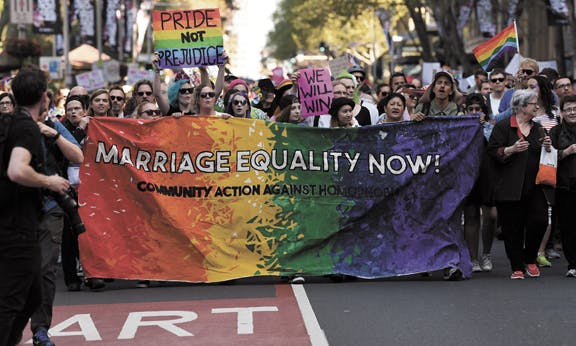Vindication of protest politics

Much is significant about the resounding victory of the “yes” campaign. But perhaps the most important, and the factor that will leave a lasting legacy in Australian political culture, was its mass nature.
It has been a fascinating case study of how to turn a highly unfavourable situation into a triumphant victory for social justice.
In 2004, when John Howard’s Liberal government amended the Marriage Act to discriminate against LGBTI people, his government enjoyed the immediate and unanimous support of the Labor Party and of nearly two-thirds of the Australian population. His move – just a few months out from a federal election – echoed a similar one taken by president George W. Bush in the US, in both cases transparently aimed at whipping up prejudice towards an oppressed minority.
Rallies held around the country to protest the amendment were small and far from optimistic.
The only organised support the marriage equality campaign enjoyed at that point was from the Greens, socialist organisations, some LGBTI groups and a handful of independent activists. To make matters worse, many LGBTI activists, especially those hailing from the student movement, were hostile to the campaign, based on their disapproval of marriage and the supposedly assimilationist implications of access to such an institution.
What the campaign had on its side, however, was the support of 30 or so percent of the population who disagreed with Howard’s move to discriminate. But this sentiment was of no consequence if it remained passive. The campaign therefore made it a priority to mobilise this support into a movement that could keep equality in the national media spotlight, pressure the politicians in Canberra and influence the other two-thirds of the population not yet won to equality.
The last 13 years have demonstrated what an important and successful orientation this has been. It is no coincidence that when the Labor Party finally changed its policy to support marriage equality – seven years after the ban was imposed – it was at a conference outside of which more than 10,000 people were rallying to demand action on marriage equality.
Regular national rallies on the anniversary of the ban each year ensured that politicians could not ignore the issue, and made it a talking point in countless households around the country. This was crucial for swinging the mass of popular opinion behind the campaign.
Added to this, mass actions and protests have had an enormous impact on those who attended them. They have been a much needed antidote to the secrecy and shame that are such pernicious features of living in a homophobic society, especially for young people. And they have given confidence to those who have attended to become active advocates for the cause, which has fuelled support for equal rights.
The mass street rallies have not been counter-posed to the lobbying favoured by the more conservative advocates for marriage equality. Despite their repeated criticisms of protest, mass street rallies have given these advocates leverage to engage with politicians and other influential people, which wouldn’t have existed had supporters of equality remained passive. Indeed, the politicians could have happily ignored the entire issue.
At times, the rallies were small and felt hopeless. At various points, many were overwhelmed by dejection or, conversely, felt that the achievement of equality was inevitable and therefore not worth bothering about. At other times, activists were pressured to accept half measures, such as second class civil unions or conscience votes over real policy change.
But because a core of people, organised into activist groups such as Equal Love, persisted with mobilising the campaign’s supporters on a principled basis, full marriage equality has remained on the agenda consistently for 13 years.
The massive rallies to support a Yes vote and the jubilant celebrations are largely the culmination of these efforts. They have made this a victory for the majority, against reluctant politicians of all stripes and those willing to resist homophobia only when they could be sure it was no longer controversial.
It is a vindication of protest politics and shows the potential for ordinary people to shape society in spite of our reactionary leaders and rulers.
